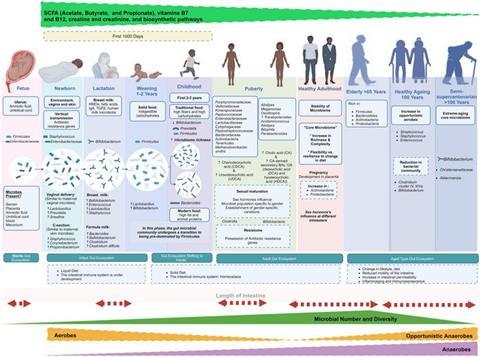Aging is a universal and complex process affecting all organisms, characterized by several genetic hallmarks such as telomere attrition, genomic instability, and epigenetic changes. Over time, aging brings about physical, biochemical, and metabolic shifts in the human body.

One significant yet understudied factor in this process is the gut microbiome (GM)—a diverse microbial community that profoundly influences health. A new review, published in Exploratory Research and Hypothesis in Medicine, delves into the dynamic interplay between the gut microbiome and aging, highlighting microbiota-dependent mechanisms that regulate aging, and examines interventions aimed at promoting healthy aging through microbiome modulation.
READ MORE: Scientists discover potential microbiome links to skin aging
READ MORE: Gut microbes from aged mice induce inflammation in young mice
From birth, the gut microbiome evolves, influenced by childbirth mode, breastfeeding, and early-life exposure to microbes. In infancy, the microbiome is less diverse, dominated by Bifidobacterium in breastfed babies and Bacteroides in formula-fed infants. By adulthood, a robust “core microbiome” develops, modulating immune and metabolic functions.
Puberty introduces sex-related changes in the microbiome, primarily due to hormonal influences. In older adults, microbial diversity decreases, leading to an abundance of frailty-linked microbes like Christensenellaceae and reduced SCFA producers. These changes impact age-related conditions such as sarcopenia and osteoporosis.
Aging-related disorders
Aging-associated shifts in the gut microbiome are linked to various age-related diseases, including neurodegenerative disorders like Alzheimer’s disease (AD) and Parkinson’s disease (PD). Dysbiosis, or microbial imbalance, has been implicated in inflammaging, a chronic, low-grade inflammation that accelerates aging.
This process is tied to diseases such as AD, PD, cardiovascular conditions, and Type 2 diabetes. Reduced levels of beneficial SCFA-producing bacteria and increased gut permeability exacerbate inflammation, which accelerates disease progression.

The gut microbiome plays a crucial role in shaping the immune system, from infancy to old age. Immunosenescence, a gradual decline in immune function, is closely tied to changes in the gut microbiome. Loss of gut microbial diversity diminishes the immune system’s ability to fend off infections, which is particularly problematic in the elderly. Studies show that maintaining microbial balance in older adults can potentially delay immunosenescence and improve immune response, reducing susceptibility to infections and age-related diseases.
Metabolic changes
The gut microbiome produces a range of metabolites, including SCFAs, polyamines, and reactive oxygen species (ROS), that influence metabolic processes and aging. SCFAs like butyrate have been shown to prevent age-related physiological decline by enhancing intestinal barrier function, modulating immune responses, and inhibiting cellular senescence. However, dysbiosis disrupts these processes, contributing to metabolic disorders such as obesity and insulin resistance.
Microbiome modulation through prebiotics, probiotics, and dietary interventions shows promise in promoting healthy aging. Probiotic strains such as Bifidobacterium longum and Lactobacillus rhamnosus have been linked to enhanced immune function and reduced inflammation in older adults. Physical activity and a balanced diet also help maintain a diverse and stable microbiome, which is crucial for longevity and health in aging populations.
The gut microbiome holds a central role in human aging, influencing everything from metabolic function to immune health. By modulating the gut microbiome through lifestyle changes and interventions, it may be possible to slow down the aging process, reduce the risk of age-related diseases, and promote healthier aging.







No comments yet